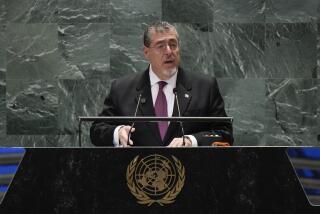Colombia Put Under State of Emergency : Civil strife: President acts after bloody attacks by guerrillas, traffickers.
BOGOTA, Colombia â Reacting to a wave of bloody bombings and other attacks by leftist guerrillas and drug traffickers, President Cesar Gaviria declared a national state of emergency late Sunday giving him new powers to fight the attackers.
âI know that the entire country is waiting for decided action against these terrorists,â Gaviria said in a television address Sunday night--his second in 24 hours.
Gaviria said that beginning this week he will decree a series of new measures mainly targeting the countryâs estimated 8,000 rebels, whom he condemned as mere criminals involved in drug trafficking.
âThe (guerrillas) no longer represent any ideal,â the president said in his 20-minute address to the nation. âThey are no longer the revolutionary vanguard. Today they are no more than the rear guard for drug traffickers.â
The government has long accused the guerrillas of participating in Colombiaâs drug trade.
Among the measures announced by Gaviria:
* Banks handling guerrilla accounts or officials or citizens giving them money will be prosecuted.
* Foreign companies, which in the past have paid rebels extortion fees or ransom, will not be allowed to renew government contracts if they continue such payments.
* Radio and television will be prohibited from interviewing guerrilla leaders or publicizing their communiques.
* Security will be increased for soldiers and police, who have been under increased guerrilla attack.
* Rewards will be offered for information leading to the capture of guerrilla leaders.
* The witness protection program will be strengthened.
The president announced the crackdown after meeting for several hours with his ministers and the chiefs of the countryâs security forces. The emergency meetings were called after leftist guerrillas carried out new attacks in their biggest offensive this year and drug traffickersâ gunmen shot and killed more police officers in the city of Medellin.
The explosions of at least 30 bombs targeting banks in several Colombian cities early Sunday killed at least five people and wounded another 60, according to an official report.
The report said the bombings were carried out by the Simon Bolivar Coordinating Front, an umbrella organization made up of the countryâs two active rebel groups, the Revolutionary Armed Forces of Colombia, known as the FARC, and the National Liberation Army, or ELN.
Just hours before the bombings, guerrillas overwhelmed a remote southern Colombia security post, killing 26 police officers charged with guarding an oil field in the jungle. Five guerrillas were killed in the battle, which lasted hours.
Colombiaâs constitution allows the president to declare a âstate of internal commotionâ for 90 days, giving him the power to suspend laws by decree. Gaviria pledged to use his emergency powers to fight the FARC and the ELN by destroying their sources of income, not just drug trafficking, but also kidnaping, extortion and robbery.
âWe are going to attack with decision and firmness the sources of subversionâs financing,â the president said.
Experts who have studied the FARC and the ELN say they have been able to survive the collapse of Soviet communism by learning to finance themselves instead of depending on foreign aid from Cuba and elsewhere.
Attacks by the FARC and the ELN, with 6,000 and 2,000 combatants, respectively, have killed 17,465 Colombians in the last five years and caused $385 million in damage, according to an estimate published Sunday by Bogotaâs El Tiempo newspaper.
The government and the guerrillas broke off peace talks in late March because of disagreements over the size of the areas where guerrillas would have gathered to begin the process of demobilization.
Gaviria also said he was planning to offer rewards for the capture, dead or alive, of FARC and ELN leaders.
It was just such a reward that led to the death of Brance Munoz Mosquera, the commander of the Medellin cocaine cartelâs terrorist squads. Police shot and killed Munoz in an Oct. 28 confrontation.
Authorities have accused the leader of the cartel, fugitive Pablo Escobar, of retaliating for the death of his military chief by ordering the killings of police officers in Medellin.
Even as rebels were carrying out their weekend attacks, gunmen shot and killed another three officers in the city, bringing to 22 the number murdered since Munozâs death.
More to Read
Sign up for Essential California
The most important California stories and recommendations in your inbox every morning.
You may occasionally receive promotional content from the Los Angeles Times.










